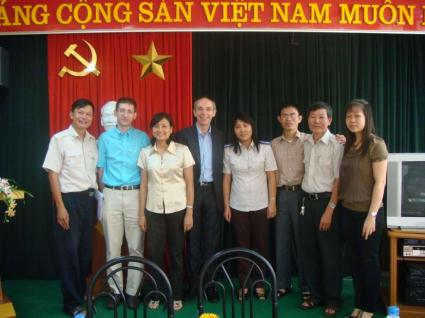Towards a Body of Independent Judicial Officers in Vietnam
Within the Framework of International Cooperation and Thanks to the Financing of the European Union, Acojuris Send in July 2008 Two experts, of Which Bernard Menut, Secretary of the Board of the UIHJ, to Assist Authors of the Vietnamese Bill on Enforcement.
The experts and the team working on the draft law

A Reform Planned for July 2009
Before the fall of Diên Biên Phu, Vietnam had an independent body of enforcement agents. With the consecutive political changes due to the important conflicts Vietnam was faced with, the communist model was set and, along with this measure, enforcement agents were made part of the public service.
But history is always repeating itself or is a perpetual pendulum. In this country of more than 80 million inhabitants, an enforcement agent should reappear based on the liberal model.
The process is only at its beginning but the principle of the independence of the enforcement agent should be enacted in the draft law, even if its field of application appears reduced for the time being.
Within the framework of international cooperation and thanks to the financing of the European Union, the Agency of international legal co-operation (Acojuris) send in July 2008 two experts, Bernard Menut, secretary of the board of the UIHJ and Emmanuel Guinchard, Lecturer at the University of Northumbria (England), to assist the authors of the Vietnamese bill on enforcement. The one week mission proved to be very dense. Expectations on the Vietnamese part were numerous.
The experts reviewed the existing 195 articles of the draft bill on enforcement in civil matters, underlining here and there insufficiencies, and suggesting changes or simply the abandonment of such measurement they considered to be too heavy and unproductive. The draft law is set to come into effect on July 1st, 2009.
An Independent Enforcement Agent
Among the recommendations made by the experts, we find that of the creation of a list of the goods exempt from seizure, or of an enforcement Judge.
The need for patrimonial transparency was underlined and promoted by the experts as a means which can make enforcement more efficient, a need the Vietnamese part mentioned on several occasions.
The experts recorded the ambiguity brought by weapons agents are equipped with during enforcement. They recommended the suppression of this provision in the bill, just as the drastic limitation of the number of stakeholders during enforcement. Efficiency of enforcement of legal decisions is the leitmotiv of the Vietnamese authorities.
Public auctions were the object of many suggestions from the experts for an adaptation, in order to turn it into a modern and reliable process of realizing the seized assets.
The Vietnamese Ministry for justice wishes moreover to establish an independent enforcement agent shortly. This pilot project should become reality in a few months, in the south of the country, in Ho Chi Minh City (former Saigon), where conditions appear more favorable.
The Vietnamese authorities appear convinced of the rightfulness of such an establishment for the realization of their objectives of efficiency in the enforcement of legal decisions. The project needs financing for its development, undoubtedly near international stakeholders. The UIHJ and its experts should be associated with its implementation as soon as it is officially launched.
Since the end of the mission of the experts in Hanoi, the Vietnamese ministry for justice asked for precise details on certain points. This shows the interest which its carries to the proposals made by the experts. The reform process continues.
A Training Session
In the following of the July mission, Bernard Menut ensured the training of enforcement agents of the area of Hanoi and Halong. Within the majestic setting of the Bay of Halong, two training days were organized by the European project and Acojuris, in order to support the reform process.
The needs for ongoing education were underlined by Bernard Menut, who presented the French model of ongoing training of enforcement agents, such as it was conceived and implemented by the National school of procedure of Paris (ENP). The questions were many and very relevant.
Moreover the knowledge of enforcement procedures such as they are practiced in France was the subject of a special presentation which strongly interested the participants, as the nourished debates showed.
Between the lines of the exchanges, the great attraction of the liberal model for the Vietnamese professionals was remarkable. This model is considered to be more effective by the participants and especially it offers better life prospects for them. The secretary of the board of the UIHJ insisted on the need for an initial high legal level of training as a condition of the efficiency of enforcement agents and of the respect they deserve, but also on the ongoing training of enforcement agents and their future staff.


